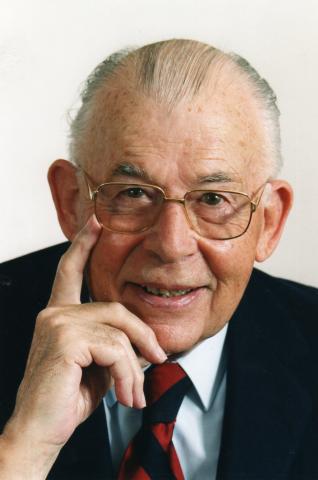
Philippe Mottu was a Swiss in the tradition of Henry Dunant, the founder of the Red Cross. Both men were touched by conflict and acted out of their Christian conviction to promote reconciliation. In so doing they added lustre to
As a Swiss Foreign Office official during the Second World War, Mottu was asked to identify and make secret links with German officers opposed to Hitler. Though their opposition proved abortive, Mottu’s links with them found fulfilment in his role as the founder of an international centre for postwar reconciliation. It was opened in the Alpine
Mottu was the son of a Calvinist pastor and came from a distinguished Genevese family who could trace their ancestry back over four centuries. He was a young banker in
Called into the Swiss Army in 1939, Mottu and his colleagues organised a resistance movement against Nazi propaganda. While in the army he studied political science in
In 1940 he was encouraged by a priest to make contact with a German diplomat, Herbert Blankenhorn, who suggested they should take a walk in a forest near
In November 1942 Adam von Trott, who had been a Rhodes scholar at
Two years later, and only days after the Allied landings in
Von Trott joined the July 1944 plot by German army officers to assassinate Hitler. The plot failed and von Trott was among those who were executed on Hitler’s orders. The news of their failure was “a terrible blow”, recalled Mottu. “On the one hand I thought of all the friends whose lives were now in danger, and on the other I knew that the war would go on even longer.”
As early as Easter 1942, Mottu had had the conviction that if
A splendid belle époque turreted building, it had been opened at the beginning of the 20th century as a resort for wealthy Europeans. During the war it was run by the Swiss Army as a centre for refugees, including escaping Allied officers and several hundred Jewish refugees who fled from
The first Germans to be allowed by the occupying Allied powers to leave their defeated and demoralised nation came to Caux. They flocked there in their hundreds over the four years after the centre’s opening in 1946. They included Konrad Adenauer, then Mayor of Cologne, who was to become the postwar Chancellor of Germany, and Hans Böckler, head of the West German trade union congress. The Germans were able to meet in Caux with French leaders, including the foreign minister, Robert Schuman, and Irène Laure, a leader of the 3,000 women of the French Resistance who was elected to parliament in the postwar intake of MPs.
Mottu saw particular significance in Laure’s encounter in Caux with Clarita von Trott, Adam von Trott’s widow. Laure’s eyes were opened to the suffering that German women had endured, equal to that of the French. This enabled her to surrender her deep hatred towards
Mottu was 32 when the Caux centre was opened in 1946. In 1996 he gave a jubilee address there. The martyrs and survivors of the July 20 plot had “played an indirect but indispensable part in establishing the contacts which led to the creation of the conference centre”, he asserted.
According to Edward Luttwak, writing in Religion: The Missing Dimension of Statecraft (OUP, 1994), nearly 2,000 French citizens and more than 3,000 Germans “took part in the Caux meetings of the formative postwar years of 1946 to 1950”.
Franco-German reconciliation was cemented in the Schuman Plan which gave birth to the European Coal and Steel Community, the organisational progenitor of the Common Market. According to Luttwak, “MRA did not invent the Schuman Plan but it facilitated its realisation from the start. That is no small achievement, given the vast importance of every delay — and every acceleration — of the process of Franco-German reconciliation during those crucial, formative years.” Others who took part in Caux in those postwar years included the mayors of
History remained Mottu’s passion. His first major book was entitled Le destin de l’occident (The destiny of the West) and his second was Regard sur le siècle (A look back over the century) (1996), which included a foreword by the former French Prime Minister Edouard Balladur.
Mottu was married to Hélène de Trey in 1939 and is survived by four children.
Philippe Mottu, leading light of postwar reconciliation, was born on October 9, 1913. He died on August 23, 2010, aged 96
First published in The Times, online edition, 11 November 2010
